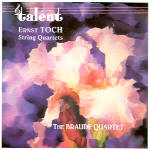The string quartet was Ernst Toch’s forte. He published twelve official quartets in his lifetime (1887-1964), but as many as seven were lost during the Holocaust. (The composer also junked five juvenilia quartets when he turned 20.) Born in Vienna, Toch received his education there, but as Europe became unsettled after World War One, he immigrated to the United States. While Toch’s latter style became heavily influenced by avant-garde trends, his early music, as exemplified in these two string quartets, Opus 12 and Opus 15, are very much of the early 19th century and profoundly Germanic. Mozart is the model here, both in structure and execution. String Quartet Opus 15 in G Major has a typical allegro-andante-vivace-allegro structure, but Toch throws in several catchy folkdance melodies, especially in the first movement and the third. The String Quartet Opus 12 in A Major is a more delicate affair and Mozart to the core. The performances of the Braude Quartet do the music justice, but I have to say that the ghosts of Toch’s Viennese predecessors give these works a mechanical character that drains the spirit from them. It doesn’t help much that the studio ambience provides a bit too much airiness to the violins and not enough underscoring depth to the cello. That aside, this is very safe music, and if you’re a fan of the string quartet as descended from Mozart, then this disc might provide some pleasure.
































